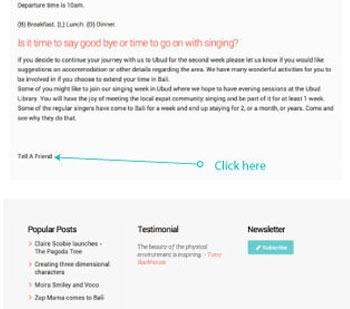Support Lindsey Pollak
by: Jennifer Richardson on

Let us know if you would like to join us in Croatia before Singing in Siena and we will sail around the Dalmatian coast. EMAIL US
To see more gorgeous pics, I've uploaded some I took in 2013 on a little recce trip in Pinterest.
The Tides of Welcome Community Choir are seeking a music professional for the position of Director.
Experience in music performance and choir direction highly preferred.
Rehearsals are held in Queenscliff (VIC) on a week night during school terms.
To obtain a Position Description contact Carolyn Williams, +613 5258 3367 or
qnhouse@fastmail.fm
Applications addressing the selection criteria close July 31st 2014.
______________
OR. Are you a choir director that fancies a one month or longer stay in Bali?
There are people lining up to have a regular choir in Ubud, Bali
If you are a teacher or workshop provider or have attended a Singabout event in the past and loved it and would you like to reduce the cost of attending an event soon would you like to reduce the cost of attending that next event? Or would you like to get paid for referring people to these events? Of course you would!
We decided that if you have had an amazing time at one of our events in the past and would love to tell others about it you could be rewarded for your efforts. And really what is the better advertisement? An expensive advertising campaign or YOU?


An interview with PYBA and Jan Cornall.
 Pitch Your Book Australia (PYBA): What do you think about the Pitch Your Book competition?
Pitch Your Book Australia (PYBA): What do you think about the Pitch Your Book competition?I was talking to a friend recently who was struggling to find time to write a book whilst holding down a job and a busy life, then that same day I stumbled across this old post by Claire Scobie written in 2011 on the same subject. I love it when that happens!
I think this article is just a relevant today as it was back in 2011 so I decided to share it with you today. I hope you find it helpful.
 _______________
_______________
Ok I'm living in Indonesia and here is one of my all time favorite versions of Gado-Gado that I found online! It's so good I had to share it with you, it's by Wil and Wayan.

Gado-gado is one of Indonesia’s most famous dishes, and with good reason– it’s delicious! The combination of sweet, spicy peanut sauce with crisp vegetables and soft potatoes or congealed rice really is something a bit different the first time you try it, too.
There is no set way of making gado-gado. In fact, the word ‘gado-gado’ has another application in the Indonesian language for talking about things that are ‘a bit of a mix’. For example, if someone speaks a mixture of Indonesian and English in one sentence, people might jokingly refer to is as ‘bahasa gado-gado’ (gado-gado language).
So, in keeping with the spirit of gado-gado, please see this recipe as flexible. Once you have the peanut sauce, try using it on other vegetables, too. The only rule is to keep the vegetables crispy and have something else soft in there to soak up the sauce!
Ingredients
Vegetables:
250g beansprouts
250g green beans
100 gr cabbage
Peanut Sauce:
125g roasted or fried peanuts
1 small chilli
2 cloves of garlic
25g palm sugar (or 2 tbsp brown sugar)
2 kaffir lime leaves
2cm kencur (white ginger – if you can get it)
salt and pepper (to taste)
Nice things to mix it up with (any or all of the below):
boiled new potatoes (quartered)
lontong (congealed steamed rice)
fried tofu
fried tempe
boiled egg
Instructions:
This can be served warm or cold but always make sure you add the peanut sauce just before you serve it. A sprinkle of fried shallots or peanuts on the top gives the texture a little more interest and a handful of prawn crackers gives it a real authentic touch. You could also drizzle some kecap manis over the gado-gado for a bit of extra sweetness or add some sambal (chilli paste) for a bit more punch.
Salamat Makan.
Lyrics to the wonderful South African song
Shosholoza
uKle ... ZontabaThula Baba is a popular Zulu lullaby.
This lullaby is sung by a mother to her child, as they await the return of their husband/father who has gone away to work. It’s a beautiful song with a powerful message.